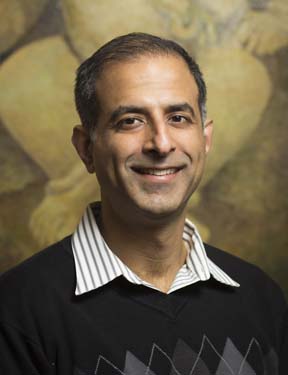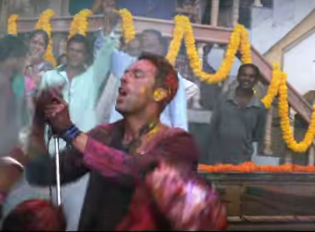Video courtesy of Coldplay Official via YouTube
(RNS) The Super Bowl halftime show promised to be a welcome respite from what went down as the most tedious, mistake-prone game in Super Bowl history.
Coldplay launched into its anthemlike “Viva la Vida,” and Chris Martin careened across the stage. But as the camera panned toward what appeared to be a Sanskrit or Hindi word on drummer Will Champion’s bass drum, our Indian-American friends took notice. The camera lingered just long enough as we finally deciphered that, no, this was no profound prayer or message, it simply read “Coldplay,” or more accurately, (Côld-ple’), as it might sound in Hindi.
My 17-year-old son was sufficiently enthused to group-text his cousins, “Can’t wait to go to the Coldplay concert in August.” To which a cousin responded, “Hope the cultural appropriation won’t keep you from going.”
Cultural appropriation? Not the Hindi words and marigolds strewn across Champion’s drums. What vexed the cousin was the recent Coldplay music video release, “Hymn for the Weekend.”
The music video, filmed in and around Mumbai, begins with the requisite Hindu mystic and the wind blowing his flowing saffron robes. A levitating monk is seen, and then there is Martin, on a temple step beginning to sing of angels: “Oh, angels sent from up above / You know you make my world light up.”

Chris Martin, center, lead singer of Coldplay, performs with the band during the Super Bowl halftime show in Santa Clara, Calif., on Feb. 7, 2016. Photo courtesy of REUTERS/Mike Blake
*Editors: This photo may only be republished with RNS-SHULKA-COLUMN, originally transmitted on Feb. 9, 2016.
RELATED STORY: Amazon’s Jeff Bezos as Lord Vishnu? Magazine apologizes for deity depiction
Later, an exuberant Martin runs through the streets where kids celebrate the Hindu festival of colors, Holi. There are the classical Indian dancers and a scene in a rather rickety old movie theater where a Beyoncé bedecked in very Indian makeup and dress commandeers the screen.
Stereotypical? Check.
Transcendent and uplifting? Not so much.
I want to be generous and say Martin was calling out to angels — the ethereal, subtle ones — as he sat on a temple step. But it is just as likely that he was referring to a much more prosaic angel — a girlfriend or lover. And when asked, he couldn’t do much better than say he was trying to write a danceable, club tune.
I lead a team of surgeons to India every year to teach a surgical workshop. Our team has traveled from Delhi to Hyderabad and Ahmedabad to Mumbai. My colleagues have been jolted by an elephant meandering along a highway and monkeys carousing along rooftops and trees. India is radically different from the West, and a first-timer could fill gigabytes with photos of just what the music video captured.
Appropriation? That’s complicated.
Cultural appropriation is a neutral, descriptive term that simply refers to the use of icons or elements of one culture by members of a different one. The song lyrics do not mention India, and on face value, India and its Hindu iconography are relegated to scenic backdrops.
But appropriation matters when it speaks to asymmetries of power, and when there is an intent that is harmful to the culture being appropriated. And it is why, in this case, I give Martin a pass.
READ: Vows and body piercings abound as Hindus celebrate Thaipusam in Malaysia
Indian-Americans don’t see Orientalist tropes playing out behind every camera shot. They have long moved past hangovers of British colonial rule. Far from trying to shield or dissemble its problems, self-confident Indians might say, “We’ve got our problems, and we’re dealing with them, thank you very much.”
And as a physician host in India once told me, “You’re welcome to come and see what we’re about, and if you care to peel away the surface, you might see a humanity, spirituality and love that will move you as it has millions.”
Martin seems to have been guided by an authentic purveyor of Indian spirituality. His onetime yoga teacher, Eddie Stern, was a disciple of Pattabhi Jois, the Indian guru who promoted the Ashtanga Vinyasa school of yoga. Stern teaches yoga in the halls not of sterile, crassly commercialized studios, but a Hindu temple in New York City.
And Martin’s fascination with India seems to be a bit more than fleeting or voyeuristic: He was committed enough to meet the Indian prime minister to pitch in on his flagship sanitation and cleanliness campaigns. Martin may not be a George Harrison, who was spiritually transformed after his India immersion, but the culture and religion seem to be more than mere props for him.
The fight against legitimate examples of misappropriation is well underway, and Hindu-Americans need allies. There are the obvious battles over Hindu icons displayed on shoes, beer or underwear. But there are more important and pervasive issues as well.
It is no less than theft, some argue, when yoga journals, teachers and studios delink yoga from its roots and commodify the spiritual practice. Authentic yoga teachers today acknowledge the Hindu roots of yoga.
Hindu Americans are uniting also to tackle horrific errors in school textbooks from California to Texas to Virginia that depict Hinduism as little more than a cliché of caste, cows and karma.

Dr. Aseem Shukla is co-founder of the Hindu American Foundation (www.hafsite.org) and associate professor of surgery at the University of Pennsylvania. Photo courtesy of Hindu American Foundation
And there is a movement afoot to counter inherent disparities in academia, where some tenured professors, long respected as interlocutors of India and Hinduism, are being exposed for their rollicking exotic, eroticized portrayals of Hinduism. To these academics, Hindu scripture is not a font of transcendent philosophical stirrings as it is for a billion Hindus, but a canvas to be desecrated with explicit appropriations. To take one example, Lord Shiva is sometimes appropriated as a strap-on sex toy.
The Coldplay video did not tread new ground, nor did it offer any stirring insight into a deeply textured Indian society. But let’s save the tortured, manufactured outrage over a music video and commit to real action against serious problems that affect the very narrative defining the Hindu-American experience.
(Dr. Aseem Shukla is co-founder of the Hindu American Foundation)





